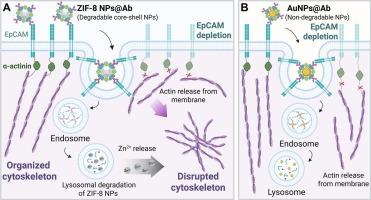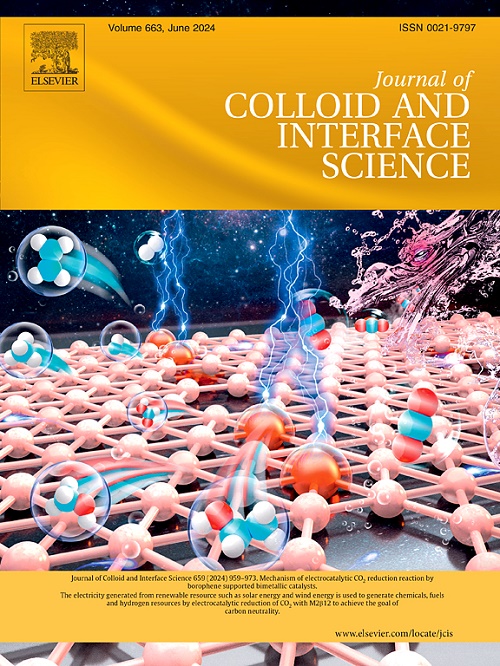利用核壳金属有机骨架纳米颗粒靶向和破坏细胞骨架以抑制癌细胞迁移
IF 9.7
1区 化学
Q1 CHEMISTRY, PHYSICAL
引用次数: 0
摘要
癌症转移是由癌细胞的运动驱动的,这是一个由肌动蛋白细胞骨架控制的过程。然而,目前旨在抑制癌细胞迁移的肌动蛋白干扰药物存在选择性差和脱靶效应。在这项研究中,我们提出了核壳金属有机框架纳米颗粒,旨在特异性靶向和破坏迁移癌细胞的肌动蛋白细胞骨架。我们证明,通过使用低剂量的EpCAM抗体功能化的咪唑酸分子筛框架-8纳米颗粒(ZIF-8 NPs@Ab)靶向与迁移相关的表面标记物上皮细胞粘附分子(EpCAM),可以显著抑制乳腺癌和前列腺癌细胞的迁移和侵袭。单细胞成像显示,观察到的细胞迁移的抑制是由于肌动蛋白细胞骨架的破坏。机制研究强调了可降解的ZIF-8纳米颗粒核心和epcam靶向抗体壳在细胞骨架破坏中的协同作用。考虑到癌细胞迁移相关表面标记物的广泛表达和ZIF-8 NPs的普遍肌动蛋白破坏活性,该纳米颗粒系统提供了一种通用的、有效的、潜在的更安全的策略来抑制癌细胞的运动。本文章由计算机程序翻译,如有差异,请以英文原文为准。

Targeting and disrupting cytoskeleton using core-shell metal-organic framework nanoparticles to inhibit cancer cell migration
Cancer metastasis is driven by the motility of cancer cells, a process governed by the actin cytoskeleton. However, current actin-disrupting drugs aimed at inhibiting cancer cell migration suffer from poor selectivity and off-target effects. In this study, we present core-shell metal-organic framework nanoparticles designed to specifically target and disrupt the actin cytoskeleton in migratory cancer cells. We demonstrate that the migration and invasion of breast and prostate cancer cells can be significantly inhibited by targeting a migration-associated surface marker, epithelial cell adhesion molecule (EpCAM), using low-dose EpCAM antibody functionalized zeolitic imidazolate framework-8 nanoparticles (ZIF-8 NPs@Ab). Single-cell imaging reveals that the observed inhibition of cell migration results from disruption of the actin cytoskeleton. Mechanistic investigations highlight the synergistic roles of the degradable ZIF-8 nanoparticle core and the EpCAM-targeted antibody shell in cytoskeletal disruption. Given the widespread expression of cancer cell migration-related surface markers and the universal actin-disrupting activity of ZIF-8 NPs, this nanoparticle system provides a versatile, effective, and potentially safer strategy to inhibit cancer cell motility.
求助全文
通过发布文献求助,成功后即可免费获取论文全文。
去求助
来源期刊
CiteScore
16.10
自引率
7.10%
发文量
2568
审稿时长
2 months
期刊介绍:
The Journal of Colloid and Interface Science publishes original research findings on the fundamental principles of colloid and interface science, as well as innovative applications in various fields. The criteria for publication include impact, quality, novelty, and originality.
Emphasis:
The journal emphasizes fundamental scientific innovation within the following categories:
A.Colloidal Materials and Nanomaterials
B.Soft Colloidal and Self-Assembly Systems
C.Adsorption, Catalysis, and Electrochemistry
D.Interfacial Processes, Capillarity, and Wetting
E.Biomaterials and Nanomedicine
F.Energy Conversion and Storage, and Environmental Technologies

 求助内容:
求助内容: 应助结果提醒方式:
应助结果提醒方式:


